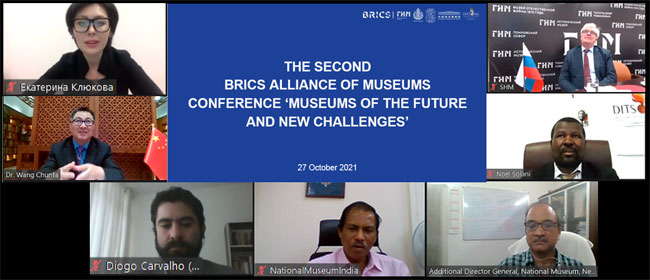
Chinese President Xi Jinping pointed out at the 13th BRICS Summit on September 9th, 2021 it is necessary to strengthen people-to-people exchanges in the spirit of mutual learning, and actively host the BRICS forum on people-to-people and cultural exchanges. The Second BRICS Alliance of Museums Conference & Academic Forum was hosted in Moscow, Russia on October 27th, 2021. Dr. Wang Chunfa, Director of the National Museum of China (NMC), attended the Conference and delivered a keynote speech via video link in Beijing. Olga Lyubimova, Minister of Culture of the Russian Federation, gave an opening speech. The directors and representatives of the Brazilian Institute of Museums, the State Historical Museum of Russia, the National Museum of India, New Delhi, and the Ditsong National Museum of Cultural History, South Africa also attended and spoke at the Conference via video link.
Focused on "Museums of the Future and New Challenges", the participants explored latest trends of museum development such as accessibility and social inclusion, digital reality, and new media trends regarding the museums, shared their key actions that have been taken to cope with the impacts of COVID-19 and discussed the necessity and importance of exchanges and cooperation within the BRICS Alliance of Museums in this context.
Wang Chunfa noted that new technologies had quickly developed and digital reality technology were widely applied. These technologies have been used in conservation, exhibition, presentation and social services of cultural relics towards making museums "smarter". Also, the application of digital reality technology has higher requirements for museums in data resource development and staff restructuring. Wang gave three suggestions on the future application of digital reality technology in museums. Firstly, museums should strengthen collection research to tap deeper into the cultural meanings of museum collections. Secondly, museums should improve data resource development to establish a big data management system. And thirdly, museums should build stronger workforces through staff training mechanism that includes the application of digital reality technology. Wang said that the NMC was ready to work with other members in leading the Alliance to make adaptive changes, keep up to date and cope with post-COVID changes brought about by new technologies. These opportunities will open new horizons for the BRICS Alliance of Museums.
The participants agreed that, since the inauguration of the Alliance, the NMC, as the initiator, had led the organization of diverse events including the "Sharing a Common Future: Exhibition of Treasures from National Museums along the Silk Road", the Global Museum Directors Forum, and the "Treasure Hunt Relay: Global Museum Director's Choice". These events have had a significant positive impact and facilitated the exchanges and interactions between members of the Alliance and the dissemination and promotion of the cultures of the BRICS countries. Facing the complicated international situation and the impact of COVID-19, the BRICS Alliance of Museums will continue to work to increase the exchanges and cooperation among its members, and effectively lead museums in the dialogue of civilizations spanning time and space. The Alliance will focus on building more open and inclusive museums, strengthening the connections between museums and the public, and developing different cultures to benefit the wider populations. The members will work together to make more contributions to the progress of human civilization.
The BRICS Alliance of Museums was established as an achievement of the Second Meeting of BRICS Ministers of Culture and it is an inter-museum cooperation mechanism that was initiated by the NMC in 2018 in respond to the initiative of the Ministry of Culture and Tourism of China.